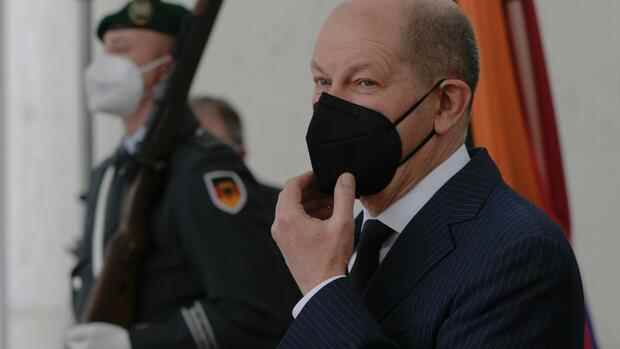The Chancellor must now reinvent his coalition under completely new premises.
(Photo: AP)
Today’s special session of the German Bundestag marks a turning point in the Berlin Republic: nothing is as it was. Chancellor Olaf Scholz no longer only delivers solidarity addresses to Kiev. The federal government trades and supplies arms to Ukraine.
Russia’s exclusion from the Swift payment information system also seems to be a done deal. Anything else would have been impossible to convey. In principle, the Germans refuse to deliver arms to crisis areas.
But Wolfgang Ischinger, head of the Munich Security Conference, aptly summarized the situation on Twitter with two questions: “If the Russian flag were to be hoisted in Kiev – are we aware that in the event of a rape we would be accused or threatened?” looked away? And that after 1941 to 1945?”
But when Scholz explains these decisions in the Bundestag today, he should not stop there. Whether it is the federal government or the head of the opposition, Friedrich Merz, those responsible in politics should abandon many of their political demands. Everyone is looking for a bit of security in their own positions. But the attack by Russian President Vladimir Putin on Ukraine shook Europe and the whole world upside down.
Top jobs of the day
Find the best jobs now and
be notified by email.
>> Read about this: “A Swift ban that hits the right ones” – Europe agrees on next sanctions against Russia
With enormous effects on Germany. For a long time, the Anglo-Saxons in particular had been calling for Germans to take on fundamentally greater responsibility for foreign and security policy. Even if the government has now acted, the Federal Chancellors and their governments did and still have difficulties in doing so, also in view of Germany’s history. But even after the end of the Ukraine war, Germany’s special approach, which relies primarily on checkbook diplomacy, is finally over.
The coalition agreement is actually lapsed.
The coalition agreement is actually lapsed. All three coalition partners have to accept major compromises.
The two percent NATO target, which every government has so far successfully avoided, must now ultimately be met immediately. Federal Finance Minister Christian Lindner has already offered to provide the financial means for this.
The FPD man cannot let the long-needed equipment of the Bundeswehr fail because of the previously defended debt brake, which is justified in times of peace.
Economics Minister Robert Habeck, on the other hand, will have to expect his Greens to make unpleasant decisions. Of course, Germany must continue to deliver weapons to crisis areas if necessary. Habeck is responsible for arms exports.
And then energy prices will rise so much that the phase-out of coal cannot be brought forward. Germany should also discuss the continued operation of the three nuclear power plants that are still connected to the grid. As important as the green transformation of the economy is, it would be risky to change production processes and value chains in the middle of a military conflict.
The SPD must change its Russia policy
And the SPD must distance itself from its previous policy on Russia as much as possible. She completely misjudged the situation. Running after Gerhard Schröder was obviously a mistake. Hopefully Chancellor Olaf Scholz has already spoken to his old rival Sigmar Gabriel, who today maintains relations with the USA with the Atlantic Bridge.
Scholz and his traffic light coalition have already risen to this challenge, but they can still fail at it.
The consequences for Germany and Europe will only become clear in a few weeks or months. However, should Russian President Putin succeed in fully annexing Ukraine, the question arises as to what his next targets will be. Non-aligned Finland, the Baltics or a bit of Poland?
It doesn’t have to be like this. But if that were to happen, Germany should be prepared. And the Bundeswehr no longer stand there bare.
More: How western managers of Russian companies react to the Ukraine war
